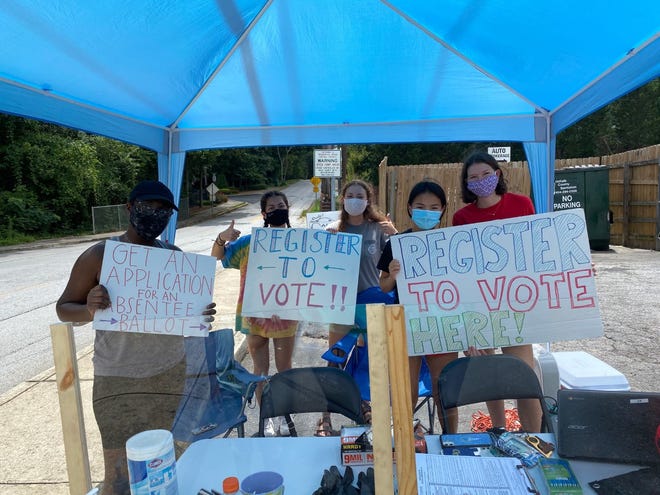Teens still able to make political change even without the ability to vote
They’re not 18 yet, but several St. Pius X students have already been active in Georgia’s recent elections
Junior Ava Nieman (2nd from right) stands at a booth outside Oak Grove Market last fall to encourage young adults to register to vote.
March 1, 2021
Although junior Ava Nieman couldn’t vote in this previous election, one of her main focuses in 2020 was mobilizing the youth of Georgia to the polls.
“As a US citizen, people have the right to participate in our democracy. I wanted to make sure everyone could actively use their voice through their vote,” Nieman said.
With the Senate runoff in Georgia becoming a crucial race, Nieman knew how crucial youth turnout would be and how important it was to help teenagers get registered to vote.
“When I reach out to other young people that are close to my age, it is less intimidating for them as I ask them to vote,” Nieman said. “It was also easier to virtually mobilize youth voters through social media and reaching out to voters at other high schools.”
As American politics seem to be peaking in popularity right now, an increasing number of teenagers are educating and involving themselves in local and even national politics.
Junior Gabrielle Harris and her sister were involved in the senate runoff last fall by going door to door as part of political campaigning, a very unusual job for most high schoolers, but crucial in creating votes. She believes in the power of young people in politics, even without the power of the vote.
“I see a lot of teenagers say that they don’t care about politics because it doesn’t affect them,” Harris said. “Politics is more than just what we see in [the] media. It can affect power bills, school resources, and, as we’ve seen, whether the Earth will still be here in 20 years. It’s important for everyone, teenagers especially, to understand that their future is affected by who’s in office and the facets of politics coming with that.”
Teenagers are often disregarded in electoral politics, but teens here at St. Pius X as well as across the country determined to demonstrate how their voices can cause real change.
Adults may say teenagers are too young to be so involved in politics, but junior Michael Schlueter disagrees.
“As [teenagers] get to the voting age, we should be educated in politics so when it comes to deciding for voting we know what each party represents,” Schlueter said.
Nieman, Harris, and Schluter aren’t old enough to vote yet, but they want to let people know that they can still make waves in the world of politics.
According to Nieman, teenagers should still remain educated on national and local issues and their relevance in politics. Even if you can’t vote, your voice can still be heard in other ways, like forming petitions, protests, or even something as simple as writing a letter to your representatives in Congress.
Politics were meant to be the voice of the people, and teens should remember their voice still deserves to be heard, even if they can’t vote just yet.






